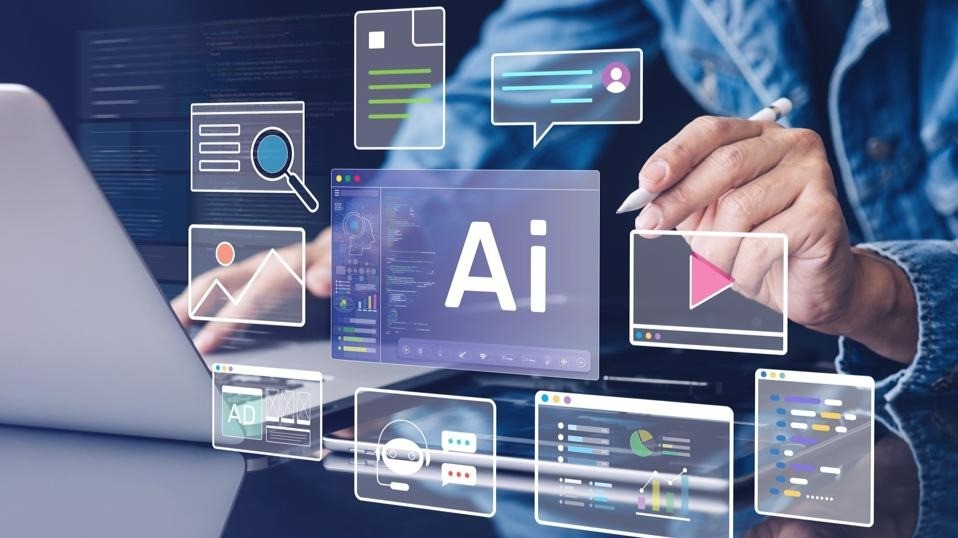4 Powerful Examples Of How AI Is Used In The NHS
2 July 2021
In November 2018, Health Secretary Matt Hancock said artificial intelligence (AI) “will play a crucial role in the future of the NHS”, as he set out plans to transform our health service over the next ten years or so. But what does this vision of an AI-enabled NHS mean, and how is AI already being used in the NHS? Read on to find out.

The vision for the NHS
The UK government has said it wants AI and data to “transform the prevention, early diagnosis and treatment of chronic diseases by 2030”. In other words, AI could be used to help healthcare professionals diagnose conditions and plan the best course of treatment – thereby improving patient outcomes, saving money and saving lives. After all, the earlier a condition can be diagnosed, the better the chance of treatment being successful.
It’s a grand vision, but is it achievable? NHS trusts seem to think so; around half of NHS trusts are reportedly investing in AI technology.
The government is also opening five centres dedicated to exploiting the potential of AI in healthcare. Based in London, Glasgow, Leeds, Oxford and Coventry, each centre will focus on a particular application of AI, and share its findings with relevant partners around the UK. For example, the London Medical Imaging and Artificial Intelligence Centre for Value-Based Healthcare (not the snappiest name, admittedly) will look at the use of AI in medical imaging for faster diagnosis.
This is all possible because the NHS is an organisation that’s particularly rich in data. AI systems “learn” from data, which means they need a lot of data in order to work properly. Dealing with more than 1 million patients every 36 hours, the NHS is sitting on a wealth of data on everything from obesity to cancer. This data can be used to train AI systems.
How is the NHS already using AI? Four real-world examples
AI is already being used in healthcare settings around the world. Its application in the NHS is, so far, relatively limited but there are some inspiring examples that give great hope for the future. Let’s look at a few of those examples of AI in the NHS:
Addenbrooke hospital in Cambridge is using Microsoft’s InnerEye system to automatically process scans for patients with prostate cancer. The system takes a scan image (all scans are anonymised, so patient data is kept private), outlines the prostate on the image, marks up tumours and reports back. This is speeding up prostate cancer treatment, and the hospital is looking at using the same technology for brain tumour patients.
HeartFlow’s AI technology is also being used in the NHS. This system analyses CT scans of patients who are suspected of having coronary heart disease and then creates a personalised 3D model of the heart that shows how blood is flowing around it. This helps doctors spot where blood flow is disrupted by blockages. HeartFlow analysis is far less costly and intensive than the standard angiogram procedure (which assesses restricted blood flow by pumping dye into the heart). In fact, HeartFlow cuts costs by a quarter.
The “C the Signs” app is being piloted by GPs and practise nurses in Merton and Wandsworth. The tool uses AI to help GPs and nurses cheque combinations of signs, symptoms and risk factors during patient consultations so that they can identify patients at risk of cancer earlier. The tool also helps to identify which referrals and investigations the patient might need.
Google’s DeepMind firm has been working with Moorfields Eye Hospital NHS Foundation Trust since 2016 to help clinicians improve the way serious eye conditions are diagnosed and treated. DeepMind has developed AI technology that’s able to automatically identify sight-threatening eye conditions within seconds, and rank patients in order of urgency for treatment. The company says its system has matched the accuracy of eye doctors with 20 years’ experience.
Does this mean technology will replace doctors?
In a word, no. AI isn’t going to replace doctors and nurses in the NHS, and the chances of you having a consultation with a robot instead of your GP are slim. Besides, replacing human workers isn’t the goal; the idea is to augment the work of healthcare professionals by automating or streamlining time-consuming tasks (like checking scan images). This will allow doctors and nurses to spend more of their precious time on patient care, deciding the best course of treatment and improving patient outcomes. After all, that’s where their real expertise lies.
AI must be used strategically in the NHS
As in any organisation, any use of AI in the NHS must always be driven by strategy. AI brings with it some complicated challenges; for the NHS, patient trust and the ethical use of patient data will be big hurdles to overcome. Health data is incredibly personal, and people are naturally sceptical about trusting the diagnosis of, say, cancer to a machine. This means it’s vital that NHS trusts create a thorough AI strategy before they delve into practical applications.
But, providing it’s used strategically and ethically, the potential rewards of AI in the NHS are huge. As someone who’s worked with healthcare organisations to develop their data and AI strategies and understand the implications of AI, I believe the AI-enabled future of the NHS is extremely bright.
Where to go from here
If you would like to know more about AI, cheque out my articles on:
Related Articles
5 ESG Trends That Will Shape Business in 2026
By now, “smart” versions exist of just about every home appliance, gadget and gizmos we can think of. However, manufacturers continue[...]
The 5 Robotics Trends In 2026 You Must Get Ready For Now
By now, “smart” versions exist of just about every home appliance, gadget and gizmos we can think of. However, manufacturers continue[...]
10 Generative AI Trends In 2026 That Will Transform Work And Life
By now, “smart” versions exist of just about every home appliance, gadget and gizmos we can think of. However, manufacturers continue[...]
Dreamforce 2025 Proved The Agentic Enterprise Has Arrived
By now, “smart” versions exist of just about every home appliance, gadget and gizmos we can think of. However, manufacturers continue[...]
The 8 Biggest AI Agent Trends for 2026 That Everyone Must Be Ready For
By now, “smart” versions exist of just about every home appliance, gadget and gizmos we can think of. However, manufacturers continue[...]
7 Workplace Trends That Will Define 2026
By now, “smart” versions exist of just about every home appliance, gadget and gizmos we can think of. However, manufacturers continue[...]
Sign up to Stay in Touch!
Bernard Marr is a world-renowned futurist, influencer and thought leader in the fields of business and technology, with a passion for using technology for the good of humanity.
He is a best-selling author of over 20 books, writes a regular column for Forbes and advises and coaches many of the world’s best-known organisations.
He has a combined following of 4 million people across his social media channels and newsletters and was ranked by LinkedIn as one of the top 5 business influencers in the world.
Bernard’s latest book is ‘Generative AI in Practice’.










Social Media